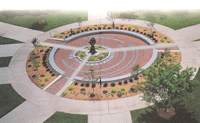
Dorothy Goodpasture
is honored with a Brick from Nancy Kassebaum Baker
DOROTHY BANGS GOODPASTURE
Dorothy Goodpasture shared the nation’s birthday – July 4 – and agreed with its founding leaders that a well-informed and active citizenry was important. She dedicated much of her life to improving the quality of education and encouraging political participation.
Dorothy Ruth Bangs was born July 4, 1914 in Newton, Kansas. She grew up in Salina and graduated from Salina High School. Dorothy then became the third generation of her family to attend the University of Kansas. After graduating in 1936 with a BA in Economics, Dorothy completed one year of graduate work at the Chicago Theological Seminary and University of Chicago.
While working as a receptionist at the hospital affiliated with the University of Chicago School of Medicine, she met a young resident physician, Dr. Willard Carter Goodpasture. They were married in May 4, 1940, and Dorothy soon embraced the challenges and triumphs of motherhood, raising four children: Dorothea (b. 1941); Hewitt (b. 1943); David (b. 1949); and Cynthia (b. 1952).
Life with a young doctor during World War II resulted in several moves. The family finally returned to Kansas, and Dr. Goodpasture began his medical practice in Wichita in 1948.
Before long, Dorothy added volunteer to her roles of wife, homemaker and mother. According to her daughter Dorothea, she was “intelligent, opinionated and wanted to share her opinions.” She was interested in making things better, and committed herself to vital community issues such as equal education, integration and open housing.
The Wichita League of Women Voters were leaders in these issues during the 1960s and 1970s, and Dorothy became an active member. She served on numerous committees and took on various leadership roles, including a term as president from 1966-67. Later, after she and Willard moved to Hutchinson, Dorothy was active in the Hutchinson League.
Dorothy’s leadership abilities came to the forefront when she was elected to the Wichita Board of Education. She served three terms as a board member, from 1957-69. These were turbulent times, especially when the board decided to end segregation in the Wichita school system. Dorothy championed this decision, and she also advocated for higher pay for teachers and a meaningful grading system for elementary students. Dorothy’s dedication to improving the educational system led her to serve as president of the Kansas Association of School Boards and board member of the National School Boards Association. In 1971, she received a special commendation from the National Education Association.
Dorothy community involvement also included working as co-chair of the 1961 Mayor’s Commission which oversaw a successful bond election to build the Century II Civic Center.
Dorothy’s many years of activism in the community were recognized in 1973 when she received the Brotherhood Award from Wichita’s chapter of the National Conference of Christians and Jews. Sen. Hubert Humphrey presented the award to Dorothy and referred to her as “a remarkable woman…an example of voluntarism.”
Her keen interest in politics found a worthy outlet in 1978 when Dorothy joined her good friend Gwen Bell and other Kansans in actively working to elect Nancy Landon Kassebaum to the U.S. Senate. She went on to work on Nancy’s re-election campaigns in 1984 and 1990.
In 1983, Dorothy established a scholarship fund with Wichita’s public high schools to award financial aid to students pursuing a college education. Today, the scholarship fund continues to help students and perpetuates Dorothy’s lifelong devotion to making a difference in the lives of others.
When Dorothy Goodpasture died May 27, 2004, she was survived by her husband, four children, eight grandchildren and four great grandchildren.










